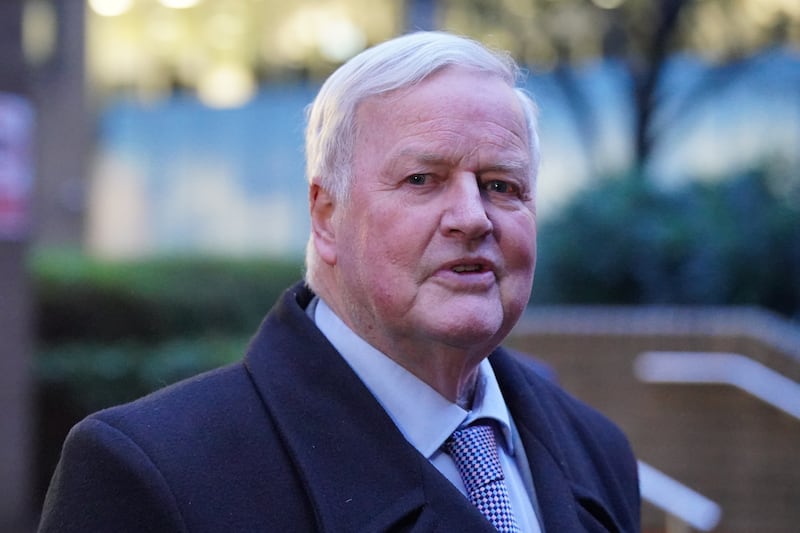Leo Varadkar has insisted it will be possible to secure prosecutions for war crimes in Ukraine.
The Irish premier was commenting following his visit to several sites in Ukraine now synonymous with atrocities on civilians during the Russian invasion.
The Taoiseach signalled Ireland’s desire to further help the Ukrainian authorities on the investigative and evidence gathering processes.
“I think many people were surprised at the fact that when it came to the atrocities that happened in Bosnia, that many, many years later people like (Slobodan) Milosevic and (Radovan) Karadzic and so on were brought to justice. So, I do think it is possible,” he said.
“So, it’s important what we do now, which is we set up the mechanisms to bring about accountability to allow trials to happen in the future, also to start collecting evidence, because it does have to be a fair trial, therefore there needs to be evidence.
“And also to keep a register of damage, so that when the war is over Ukraine can be compensated and can be rebuilt.
“And Ireland is very much involved in that side of the work.”
One of the areas Mr Varadkar visited on Wednesday was Bucha on the northern outskirts of Kyiv where he stopped at the Church of St Andrew where a mass grave was discovered after Russian soldiers retreated from the area.
Inside the building he was shown an exhibition of images of the graphic scenes captured during the exhumation process.
Ukraine’s prosecutor general Andrei Kostin, who accompanied the Taoiseach on the visit, explained the work being done to secure justice for those killed.
Reflecting on his trip to Kyiv, Mr Varadkar said it was hard to put into words his feelings after seeing at first hand the “horrors” inflicted by Russia troops.

“I’ve just been thinking about any ways we might be able to help more than we are at the moment, because what Ukraine is fighting for is for what’s right in the world, for the principle that borders can’t be changed by violence any more.
“And also the right to self-determination, the right to choose their own path, which is to become full members of the European Union.
“And I think that we should do everything that we can to continue to support them financially, politically and practically as well.”
The Taoiseach again voiced strong support for a swift start to negotiations on Ukraine’s accession to the EU.
He cautioned that gaining full membership could take some time but he highlighted the important symbolic significance of starting the process.
“There’ll be a report from the European Commission towards the end of the year and that will give prime ministers and presidents advisories, advice essentially, as to whether Ukraine is ready to begin those talks,” he said.
“But I think if that report from the commission is any way favourable, we should give the green light to talks on accession. It might be a long time before Ukraine can actually join, but beginning those talks is very important.
“And one thing President (Volodymyr) Zelensky said that really stuck with me is that soldiers and people fighting on the line for freedom, for democracy, for their European path, need to know that that isn’t just their dream, that we believe it (too) and we can make it a reality.”
On the Government’s own deliberations on Ireland’s future security policy, Mr Varadkar said the country’s history of neutrality made it better positioned to convince countries yet to take a side on the war to back the Ukrainians.
“I think the war on Ukraine and Russia’s aggression against its neighbours has made us all rethink our security,” he said.
“For us, it’s going to mean increasing our spending on defence and security and that includes areas like cybersecurity, for example. It’s not just traditional defence.”

He added: “The fact that we were a neutral country, a non-Nato country, a country that never was involved in colonialism means that we have a credibility that sometimes bigger European countries don’t have because of their history and President Zelensky specifically asked us to take that message to African countries.
“Because there are a number of African countries that are ambiguous about this conflict and see it as a conflict between east and west or a proxy conflict between Nato and Russia, when what it really is, is a traditional war of aggression, an imperial war, a big country trying to take over its neighbour.”
On Russia reneging on the Black Sea oil deal, Mr Varadkar said developing countries in the global south were set to be hardest hit if food shortages result.
“It’s too early to say what impact it will have on Ireland and Europe,” he said.
“When the war started there was initial shock to prices of energy, fertiliser and grain, but we’ve been able to find other sources and other routes.
“One thing I was talking to President Zelensky about is how we can potentially get more of the grain out through Poland and Romania, out through Bulgaria, and then also he’s been talking to Turkey about the possibility of the ships still sailing from Odesa.”








